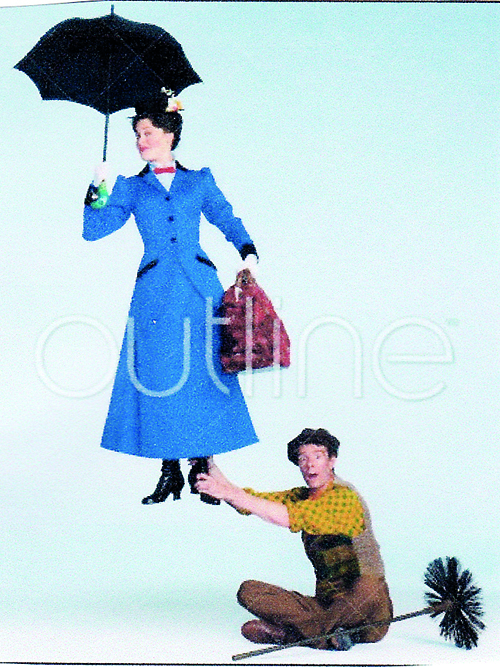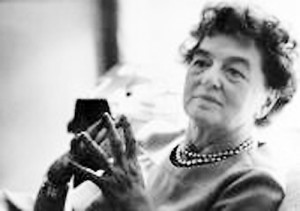Away from the magical nanny with the umbrella
P.L. Travers (Pamela Lyndon Travers) was the author of Mary Poppins – but her real name was Helen Lyndon Goff, and she was born in 1899 in Maryborough, Queensland, Australia, the daughter of a wayward alcoholic bank manager of Irish heritage but born in Deptford, London. Her mother was Margaret Agnes née Moreland who was the niece of the Premier of Queensland from 1888 to 1890. Unfortunately the misfortunes of her father’s bank job moved the family to the outpost Allora, also in Queensland, where he died two years later of pneumonia when he was 43 years old. She was only 7.

Mary Poppins: Evergreen musical
She then moved with her mother and sisters to Bowral, New South Wales, where her wealthy aunt (later the inspiration for her book Aunt Sass) owned a sugar plantation. They lived in New South Wales for ten years – but she spent some of this time during the First World War in a private boarding school in Sydney.
Even when she was a teenager the young Travers wrote and had poems published in local newspapers, and she also acted professionally using the stage name Pamela Lyndon Travers. She toured both Australia and New Zealand in various Shakespearean roles. However her family disapproved of the thespian life she was leading and in 1924 she left Australia for England and started writing in earnest. Having had some journalistic success she managed to get her poems and articles published in certain papers including the Irish Statesman whose editor was George William Russell. Russell became a significant supporter and friend and it was through him that she met W.B. Yeats who introduced her to the strange world of mythology.
George William Russell also introduced her to Madge Burnand who became a great friend and with whom she eventually shared a flat in London until they moved together in 1931 to a thatched cottage in Sussex.
After a journey to Russia her first book Moscow Excursion was published in 1934 – but it did not include any of the wild fantasy that was later to make her famous. It was in the same little thatched cottage, in the winter of 1933, that she used her full creative genius and started to write Mary Poppins. Using her wild imagination P.L. Travers was also enormously influenced by J.M. Barrie and may well have chosen her pen name using initials rather than a first name as she had done in the theatre. It is said that P.L. Travers’ work had several structural resemblances to Barrie’s Peter and Wendy and, curiously, her very first publisher was Llewelyn Davies who was Barrie’s adopted son and widely regarded as the character and model for Peter Pan.
Mary Poppins was also published in 1934 and the story of the magical nanny, who could do everything including fly with her parrot-head umbrella, was an immediate success. Between 1934 and 1989 seven more Mary Poppins sequel books were published and sold several million copies worldwide. She also had other novels, poetry and non-fiction works published – but it is the Mary Poppins books that were the enormous best-sellers. There are no accurate published numbers of how many actual books and their translations have

P.L. Travers: Long feud with Disney
been sold.
In 1964, after years of wrangling, Walt Disney released the musical adaptation of Mary Poppins based on Travers’ first four books. It starred Julie Andrews and Dick Van Dyke and became by far the biggest and best loved Disney classic ever. But the road to production was far from smooth. The fastidious Travers disapproved of the soft, loveable character of Mary Poppins that Disney had created. She did not like the music, and so hated the use of animation in the film that she banned any further adaptations of later Mary Poppins stories. Despite several attempts from the Disney studio to get her to change her mind, Travers simply refused.
Many years later Travers, then in her 90s, was persuaded to allow the West End London stage musical, she specifically agreed only on the condition that no one from the film production company was to be directly involved in the stage musical. Although the Sherman brothers, who wrote the original songs for the 1964 film, were prohibited from writing any additional songs, their original songs were allowed to be incorporated. In fact there is a section in Travers’ will directing her trustees to follow her wishes regarding exploitation of her literary works.
Last year, 2013, however saw the release of the Disney production Saving Mr. Banks – a dramatised story about the making of the classic 1964 Mary Poppins film. It stars Tom Hanks as the powerful Walt Disney, and Emma Thompson playing P.L. Travers. It is extraordinary how the film ever came to be made. She was in fact loath to agree to the 1964 film in the first place but was perhaps persuaded to do so because of a fast declining bank balance and a guarantee of $100,000 “upfront” and 5 percent of the film’s gross revenue. It was an offer even Travers could not refuse.
After a full five years of argument the film was released and won no less than five Oscars. Curiously Disney’s own edition of the Mary Poppins books by far outsold hers, but the film’s popularity and publicity caused the sales of her own published editions eventually to triple. P.L. Travers was not invited to Disney’s star-studded premiere and was reduced to begging Walt Disney himself for permission to attend. She died in 1996 never seeing the Cameron Mackintosh 2004 stage musical which opened in London and eventually transferred to Broadway in New York in 2006. The show closed in March 2013 before Disney’s film Saving Mr. Banks was released.
P.L. Travers never married but in 1940 adopted a son, one of a set of twins who were the grandsons of Joseph Howe – a friend of W.B. Yeats. Not until he was 17 did Travers’ son discover the truth of his adoption – which destroyed any relationship he had with his mother. The twin brothers eventually did meet in a pub on the King’s Road in London but, sadly like her father before her, both twin brothers succumbed to alcoholism.


